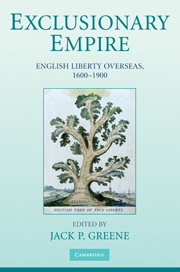Book contents
- Frontmatter
- Contents
- Notes on Contributors
- Preface
- Introduction
- 1 The Languages of Liberty in British North America, 1607–1776
- 2 Liberty and Slavery
- 3 “Era of Liberty”
- 4 Liberty and Modernity
- 5 Federalism, Democracy, and Liberty in the New American Nation
- 6 Liberty, Order, and Pluralism
- 7 Contested Despotism
- 8 “… a bastard offspring of tyranny under the guise of liberty”
- 9 How Much Did Institutions Matter?
- 10 The Expansion of British Liberties
- Index
7 - Contested Despotism
Problems of Liberty in British India
Published online by Cambridge University Press: 05 June 2012
- Frontmatter
- Contents
- Notes on Contributors
- Preface
- Introduction
- 1 The Languages of Liberty in British North America, 1607–1776
- 2 Liberty and Slavery
- 3 “Era of Liberty”
- 4 Liberty and Modernity
- 5 Federalism, Democracy, and Liberty in the New American Nation
- 6 Liberty, Order, and Pluralism
- 7 Contested Despotism
- 8 “… a bastard offspring of tyranny under the guise of liberty”
- 9 How Much Did Institutions Matter?
- 10 The Expansion of British Liberties
- Index
Summary
I know nothing of the liberty you talk of, I do not understand it; I cultivate my land, the Produce maintains my Family; I have several Wives and Children, with whom I am happy; what more can I desire?
Thus spoke an imaginary “native” of Hindustan through the unreliable mouthpiece of a committee, elected by the British inhabitants of Calcutta in 1779 to petition the Westminster Parliament. The petitioners, a motley collection of East India Company officials, soldiers, sailors, lawyers, and merchants, complained about the effects of the extension of rights in English law to native inhabitants by British judges of the Calcutta Supreme Court. The court had erred, they argued, in trying to extend British laws and liberties to Indians; they urged that if “Liberty with us is real, it is also an artificial Source of our Happiness, and that other Nations may enjoy a more perfect Felicity than ourselves, though denied the Freedom we possess.” The invented voice of the native man, secure in his religion, land, and family, exemplified the categorical distinction between happiness and liberty. The alien complexity of the English law, premised on a “Spirit of Equality and Independence,” would actually subvert the “real substantial happiness” of Indian society. “Nature and the Climate were the Legislators of the People of Hindostan,” and they had ordained that “despotic government,” with simple, summary laws maintaining a rigid social and political hierarchy, were the proper forms of rule in India.
- Type
- Chapter
- Information
- Exclusionary EmpireEnglish Liberty Overseas, 1600–1900, pp. 191 - 219Publisher: Cambridge University PressPrint publication year: 2009

